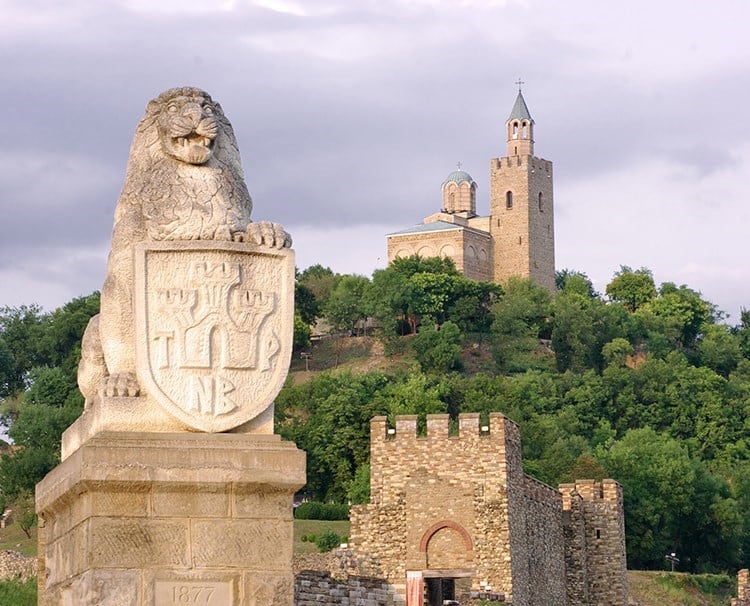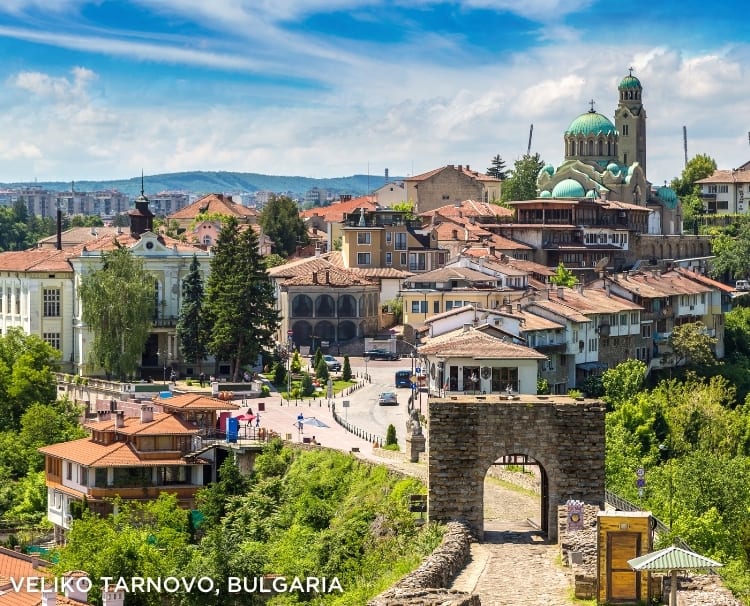Built around the site of an earlier Byzantine fort, the fortress was once the religious and political center of the Second Bulgarian Empire. Visit the Tsarevets Fortress on our Gems of Southeast Europe sailings. More than seven thousand years of history reside within these walls, even though much of what you see is the restored version of the complex. (The original was destroyed in 1393 with the Turkish invasion.)

Tsarevets Hill
The hill the fortress was built on (called Tsarevets Hill) has even more history to it – as far back as 2000 BC. It went through various periods of rises and declines in popularity as an ancient settlement – trading hands between Romans and Byzantine empires but by the 5th century, its place of importance was fully cemented with the first built fort. This was known as the period of the First Bulgarian Empire. But despite being strongly fortified, the empire rose and fell. Seven hundred years later, in the 12th century, Veliko Tarnovo became a hotbed of activity once again.
The Price of a Wedding
Tax hikes led to a massive revolt against the Byzantine Empire in 1185, headed by brothers Asen and Peter. The best of fortresses have great intrigue and love stories attached to them – and this one is no different. Weddings were expensive affairs even back in medieval times – at least for royalty and the wealthy nobility – and so Isaac II Angelus was leveraging massive taxes to pay for the impending nuptials of the Hungarian King’s daughter. The Bulgarians and Vlachs – likely not invited – rose up, resulting in the creation of the Second Bulgarian Empire that was ruled by the Asen dynasty.

Bulgaria’s Golden Age
This Second Empire brought about a golden age of Bulgaria, flourishing with trade, prosperity and (for the most part) peace. First, as was typical across Europe in the Middle Ages, a fortified wall was built around the town -- 3600 feet long, over 11 feet thick in certain parts and roughly 33 feet high. Within these walls -- a new, larger, bigger fortress was erected. With imposing stonewalls, massive gates (the only way to enter was through one of these three gates), homes, offices and churches. In fact, according to archeological finds, there were roughly 400 residential and administrative dwellings, 22 churches and 4 monasteries on the hill. These included the Throne Room, the Palace Church and the Royal Chambers. A city within a stone city. There was also an execution rock where traitors were pushed into the Yontra River. Baldwin I, the first emperor of the Latin Empire of Constantinople, was killed at the fortress as well by being pushed off what is now known as Baldwin Tower. (Bulgarian legend has it that Baldwin was trying to seduce the tsar’s wife). The Middle Ages had an extreme justice system!
The economy was thriving -- the earliest Bulgarian coinage dates to this period. Excavations have uncovered gold jewelry and gold-embroidered clothing. But after a run of tsars, the political structure could not hold and when Byzantine forces returned, they were able to scorch the fortress back to the ground in 1393.
Opening to the Public
Modern restorations began in the 1930s and were completed in 1981, marking the 1300th anniversary of the Bulgarian State. Tourists can now explore this important part of Bulgarian history – exploring the much of the fortress as it once was -- and catching some stunning, panoramic views of the city as well.
Visit the city of Veliko Tarnovo and other significant historical sites on one of our Gems of Southeast Europe sailings.